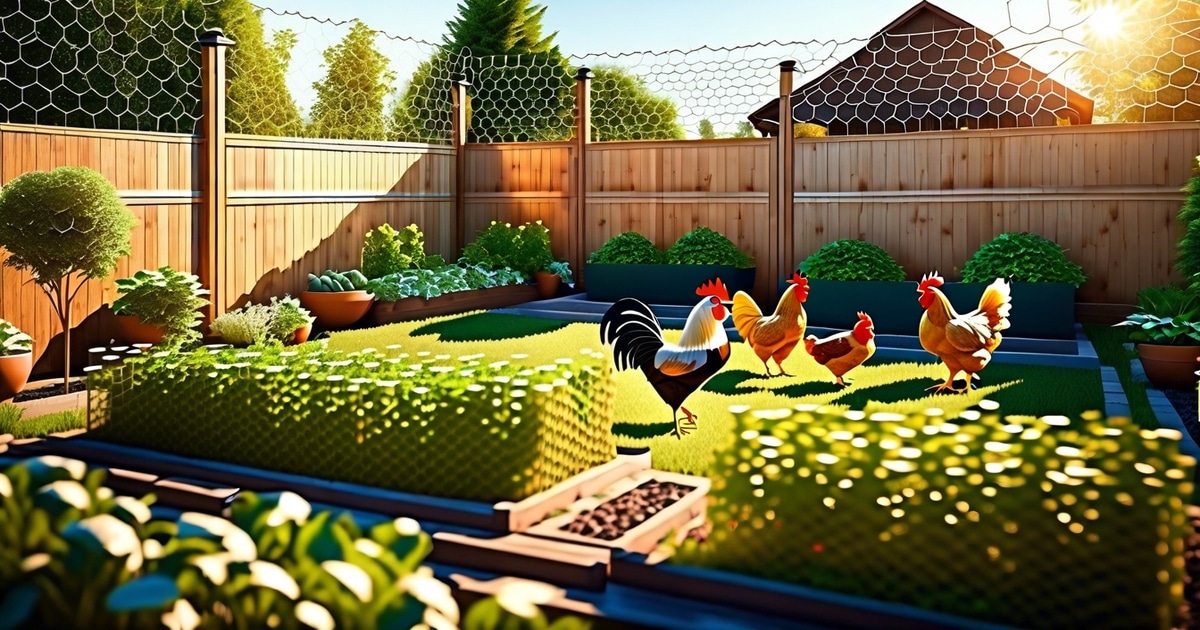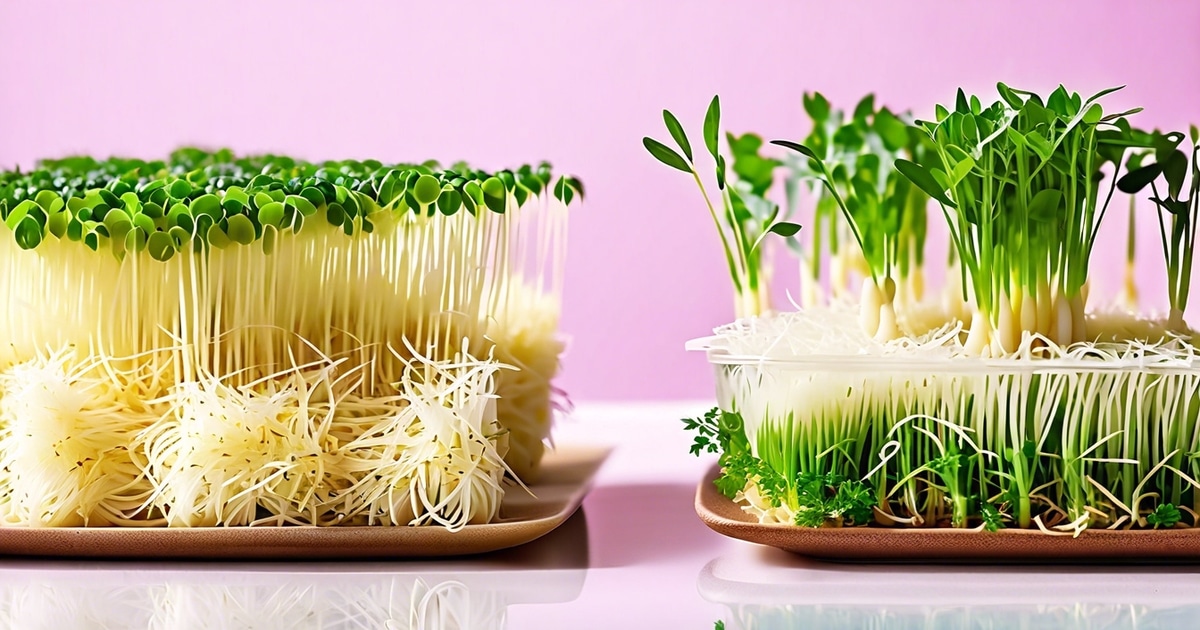Key Takeaways
- Consider the specific nutritional content of bean sprouts vs alfalfa sprouts, nutritious additions, fresh produce, and versatile ingredients to align with your dietary requirements.
- Be cautious of potential contamination risks associated with sprouts and fresh produce, and ensure strict food safety protocols to minimize health hazards.
- Explore Culinary Versatility: Experiment with alfalfa and bean sprouts in salads, sandwiches, and soups to diversify your diet and add a fresh crunch to your meals.
Nutritional Content Showdown: Alfalfa vs Bean Sprouts
Vitamin Content
Alfalfa sprouts have lots of vitamin K for blood and bones and vitamin C for boosting the immune system. For example, a cup of alfalfa sprouts has about 13% of the vitamin K you need daily, while a cup of bean sprouts has around 17% of the vitamin C you need. Both vitamins play crucial roles in maintaining overall health. While vitamin K supports bone strength and heart health, vitamin C is an antioxidant and aids collagen production.Protein and Fiber Comparison
They contain more protein and fiber compared to alfalfa sprouts. For instance, a cup of bean sprouts contains about 3 grams of protein and 1 gram of fiber, whereas a cup of alfalfa sprouts has approximately 1 gram of protein with minimal fiber content. Protein is vital for muscle repair and growth, while fiber promotes digestive health by promoting regular bowel movements.Mineral Levels
Regarding minerals like calcium and magnesium, alfalfa sprouts outshine bean sprouts. They have higher levels of both these minerals than their counterpart. For instance, alfalfa sprout consumption provides around 4% RDI for calcium and magnesium. Calcium is crucial for bone health while supporting nerve function; meanwhile, magnesium plays a role in muscle function and supports energy production within our bodies.Health Benefits: Comparing Alfalfa and Bean Sprouts
Cholesterol Levels
Alfalfa sprouts and beans are known for their potential to lower cholesterol levels thanks to their high saponin content. Saponins are compounds that may help reduce cholesterol absorption in the gut. Incorporating alfalfa sprouts and beans into your diet could support heart health by managing cholesterol levels. Alfalfa sprouts contain phytoestrogens that may support hormonal balance. Phytoestrogens are plant-based compounds found in bean sprouts and alfalfa sprouts that mimic estrogen activity in the body. This can be particularly beneficial for women experiencing menopausal symptoms or looking to maintain hormonal equilibrium throughout different stages of life.Digestive Health
Bean sprouts have lots of fiber, which is important for a healthy tummy. They help you go to the bathroom regularly and stop constipation. Eating bean sprouts can help your body digest food better and get more nutrients. Incorporating alfalfa and bean sprouts into your meals and dishes provides various health benefits, catering to different aspects of well-being, such as heart health, hormonal balance, and digestive wellness.Sensory Experience: Texture and Taste Differences
Flavor Profiles
Alfalfa sprouts offer a milder, nutty flavor, while bean sprouts taste slightly sweet and earthy. The difference in flavors between bean and alfalfa sprouts is distinct. Alfalfa’s delicate nature contrasts with the heartier crunch of bean sprouts. The mildness of alfalfa’s flavor makes it an ideal addition to salads or sandwiches where its subtle taste won’t overpower other ingredients. On the other hand, the slightly sweet and earthy flavor of alfalfa sprouts complements stir-fries and noodle dishes beautifully.Textural Contrasts
Alfalfa sprouts are known for their crispness, adding a satisfying crunch to dishes. In contrast, alfalfa sprouts offer a crunchy texture that holds up well when cooked but maintains its firmness when eaten raw. Regarding sensory experience alone, sprouts, beans, and alfalfa present distinctive qualities that cater to different culinary needs. While alfalfa adds a delicate crispness and mild nuttiness to meals like wraps or salads, bean sprouts contribute a heartier crunch suitable for stir-fries or soups.Shopping for Sprouts: Availability and Accessibility
Grocery Store Availability
Bean sprouts and alfalfa are widely available in many grocery stores due to their popularity in various cuisines, especially Asian dishes. Their presence in these stores makes bean and alfalfa sprouts easily accessible to consumers. This accessibility also contributes to the affordability of alfalfa sprouts, as they can be purchased at competitive prices from reputable sources. Bean sprouts’ availability in grocery stores is influenced by consumer demand and the potential for a good source of fresh produce. Factors such as location and local sourcing play a significant role in ensuring that these sprouts, like alfalfa, are consistently stocked on shelves, meeting the needs of consumers looking for this particular ingredient.Specialty Markets and Health Food Stores
 On the other hand, alfalfa sprouts are often found in health food stores and specialty markets due to their characteristics as a sought-after health food item. While they may not be as widely available as bean sprouts, their presence in these specialized outlets ensures that consumers who prioritize quality have access to alfalfa and other fresh produce.
The appearance and reputation of alfalfa sprouts and beans contribute to their availability at specialty markets where quality is highly valued. Despite potentially being priced slightly higher than alfalfa and bean sprouts due to factors like harvest methods and demand, their accessibility allows individuals seeking specific nutritional benefits or flavor profiles to find them easily.
On the other hand, alfalfa sprouts are often found in health food stores and specialty markets due to their characteristics as a sought-after health food item. While they may not be as widely available as bean sprouts, their presence in these specialized outlets ensures that consumers who prioritize quality have access to alfalfa and other fresh produce.
The appearance and reputation of alfalfa sprouts and beans contribute to their availability at specialty markets where quality is highly valued. Despite potentially being priced slightly higher than alfalfa and bean sprouts due to factors like harvest methods and demand, their accessibility allows individuals seeking specific nutritional benefits or flavor profiles to find them easily.
Keeping Sprouts Fresh: Storage and Shelf Life
Refrigeration for Freshness
Bean and alfalfa sprouts should be stored in the refrigerator to maintain freshness. This helps to slow down the growth of alfalfa and preserve the quality of the sprouts. By refrigerating bean sprouts and alfalfa sprouts, you can ensure that they stay fresh for a longer period. It’s crucial to rinse them before storing them. This removes any impurities and helps maintain their freshness. If you notice any wilted or discolored sprouts, remove them promptly. By doing so, you can prevent bean sprouts and alfalfa sprouts from affecting the overall quality of your remaining batch.Optimal Usage Period
To enjoy both types of sprouts, bean, and alfalfa, at their best in flavor and texture, it’s recommended to use them within a few days after purchase or harvesting. Consuming alfalfa and bean sprouts within this timeframe ensures that they retain their refreshing crunchiness while preserving their nutritional value.Safety First: Contamination Risks in Sprouts
Potential Contamination
Both bean and alfalfa sprouts pose potential contamination risks due to their moist growing conditions, making them susceptible to bacterial growth. It is crucial to rinse both bean and alfalfa sprouts thoroughly before consumption to reduce the risk of bacterial contamination. This simple step can significantly minimize the chances of ingesting harmful bacteria from bean and alfalfa sprouts. It’s important to follow strict food safety rules when dealing with bean and alfalfa sprouts. This means keeping everything clean while growing, using clean water, and storing them at the right temperature. By doing all this, we can lower their contamination risk.Precautions for Consumption
It’s important to cook bean sprouts before eating them to stay safe from getting sick. Cooking them kills any bad germs and makes them safer to eat. Also, remember to store them properly after buying to keep them fresh and safe.Green Eating: Environmental Impact of Sprout Production
Minimal Water and Space
Alfalfa and bean sprout growing don’t need a lot of water and space, so they’re good for the environment. Alfalfa sprouts use less water than regular farming, which is better for the environment. Bean sprouts don’t occupy much space and can produce much in a small area. Sprouts, including beans and alfalfa, also have a low carbon footprint due to their efficient use of resources during production. Their short bean growth cycle contributes to sustainability by minimizing energy consumption and emissions associated with longer crop cycles. As such, they are an environmentally conscious choice for those seeking to reduce their impact on the planet.Home Cultivation Benefits
 Growing your alfalfa sprouts at home is better for the environment because it reduces waste from store-bought sprouts. When you grow sprouts at home, you don’t need to use as much plastic packaging, which is good for the environment. It helps reduce waste and supports eco-friendly habits.
In addition to being more sustainable than many other food options, alfalfa and bean sprouts contribute positively to the environment through their cultivation processes and reduced waste generation.
Growing your alfalfa sprouts at home is better for the environment because it reduces waste from store-bought sprouts. When you grow sprouts at home, you don’t need to use as much plastic packaging, which is good for the environment. It helps reduce waste and supports eco-friendly habits.
In addition to being more sustainable than many other food options, alfalfa and bean sprouts contribute positively to the environment through their cultivation processes and reduced waste generation.
Budgeting for Health: Cost of Alfalfa vs Bean Sprouts
Affordability
Bean sprouts are a cheaper option than alfalfa sprouts. They are good for adding nutrition to meals without spending too much money. Both bean and alfalfa sprouts are affordable and can help people get important nutrients. In addition to being cost-effective, growing your own alfalfa or bean sprouts at home presents an even more economical alternative to purchasing them from stores. This reduces the financial burden and allows you to have fresh bean and alfalfa sprouts readily available whenever needed.Nutritional Value
Buying alfalfa or bean sprouts is worth it because they are full of vitamins and minerals that are good for your health. Even though they are cheap, they have a lot of good stuff in them that makes them a good investment for your health. Moreover, incorporating alfalfa or bean sprouts into one’s diet can lead to long-term savings on healthcare expenses by promoting good health and potentially reducing the risk of certain diseases associated with nutrient deficiencies.Culinary Creativity: Using Alfalfa and Bean Sprouts in Dishes
Versatile Ingredients
Alfalfa and bean sprouts are versatile ingredients that can add a delightful crunch and nutritious addition to various dishes. Whether you’re preparing salads, sandwiches, wraps, or stir-fries, bean and alfalfa sprouts offer extra texture and flavor to your meals. Bean or alfalfa sprouts can also be incorporated into noodle dishes for a fresh and crunchy element. Their mild flavors complement the savory profiles of noodle-based recipes, making bean sprouts a popular choice in Asian cuisines.Nutritional Boost
Adding bean or alfalfa sprouts is an excellent option for those looking to enhance the nutritional value of their meals. These sprouts, such as alfalfa and beans, are packed with essential nutrients such as vitamins C and K and fiber. By incorporating beans and alfalfa sprouts into your culinary creations, you can elevate the health benefits of your dishes without compromising on taste. Experimenting with using bean and alfalfa sprouts as garnishes for soups or toppings for various dishes allows you to explore new dimensions of flavor while reaping the nutritional rewards they offer.Summary
We looked at the nutrition, health benefits, taste, shopping, storage, safety, environment, cost, and cooking uses of alfalfa and bean sprouts. Alfalfa has some better nutrients, but bean sprouts are easier to find and cheaper. Choose based on what you like to eat and what’s good for your diet. Adding alfalfa or bean sprouts to your meals can make them healthier and tastier. You can put them in salads, sandwiches, stir-fries, or smoothies. This will give your food more nutrients and flavor. You can choose which sprout best for you based on your lifestyle and diet goals.Frequently Asked Questions
What are the nutritional differences between alfalfa and bean sprouts?
Alfalfa sprouts contain higher levels of vitamin K, C, and folate than bean sprouts. On the other hand, bean sprouts have more protein and fiber content than alfalfa sprouts.How do I store alfalfa and bean sprouts to keep them fresh?
B bean and alfalfa sprouts should be stored in a refrigerator at temperatures below 40°F (4°C). Place alfalfa sprouts and beans in a perforated plastic bag or airtight container lined with paper towels to absorb excess moisture, extending their shelf life.What is the Protein Content of Alfalfa Sprouts and How Does It Benefit People?
Alfalfa sprouts are a great source of protein, with a high content that benefits people in various ways. The benefits of alfalfa protein include muscle repair and growth, improved bone health, and better weight management. Incorporating these sprouts into your diet can boost your overall protein intake and promote a healthier lifestyle.

